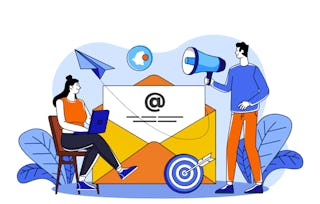Think Outside the Inbox: Email Marketing is the fourth of eight courses in the Google Digital Marketing & E-commerce Certificate. This course will explore how to execute a successful email marketing campaign. Email marketing is one of the oldest and most proven digital marketing channels, and it is an essential component of an overall digital marketing strategy. Email is a primary channel for many businesses in reaching existing customers, encouraging interaction with the business, driving purchases, and building loyalty. In this course, you’ll explore email marketing and cover topics like: creating an email marketing strategy, executing email campaigns, and measuring the results of those campaigns. You’ll also learn how to use mailing lists and utilize automation and workflows.

Think Outside the Inbox: Email Marketing

Think Outside the Inbox: Email Marketing
This course is part of Google Digital Marketing & E-commerce Professional Certificate

Instructor: Google Career Certificates
264,969 already enrolled
Included with
2,862 reviews
What you'll learn
Understand how email marketing fits into a digital marketing strategy
Write effective email copy, subject lines, and preview text
Test, execute, and optimize an email marketing campaign
Measure and analyze email campaign results
Skills you'll gain
- Email Automation
- Digital Marketing
- Email Marketing
- Newsletters
- Marketing Analytics
- Personally Identifiable Information
- Marketing Strategy and Techniques
- Marketing Automation
- Campaign Management
- Customer Retention
- Goal Setting
- Data Ethics
- HubSpot CRM
- Key Performance Indicators (KPIs)
- Promotional Strategies
- Copywriting
- A/B Testing
- Smart Goals
- Skills section collapsed. Showing 8 of 18 skills.
Details to know

Add to your LinkedIn profile
25 assignments
See how employees at top companies are mastering in-demand skills

Build your Marketing expertise
- Learn new concepts from industry experts
- Gain a foundational understanding of a subject or tool
- Develop job-relevant skills with hands-on projects
- Earn a shareable career certificate from Google

There are 5 modules in this course
You will explore what email marketing is, how it works, and why it’s useful. You’ll also learn the importance of email marketing to meet business goals. Then, you’ll use the PESTLE and SWOT frameworks to set SMART email marketing goals. To wrap up module 1, you’ll learn best practices in email marketing and how to apply them.
What's included
10 videos6 readings3 assignments1 plugin
You will examine the most common types of marketing emails. First, you’ll learn about emails that greet customers, like acquisition emails and welcome emails. Next, you’ll learn about emails that entice subscribers, such as newsletters and promotional emails. You’ll focus on emails that keep customers, known as retention emails. Then, you’ll explore how to craft catchy email copy, write sample subject lines, and create preview text for marketing emails.
What's included
7 videos5 readings5 assignments1 plugin
You will learn about useful tools for email marketing. You’ll determine how to create and segment email lists. You’ll also learn how to write effective emails that engage with customers. After that, you'll explore email marketing tools like HubSpot and Mailchimp and learn how they work. Then, you’ll explore crisis management and how to correct mistakes in email marketing.
What's included
8 videos11 readings7 assignments1 plugin
You will learn about the key metrics in email marketing, such as open rate, click-through rate, unsubscribe rate, complaint rate, conversion rate, bounce rate, and more. You’ll examine how to measure, track, and analyze email campaign results. Then, you’ll learn how to effectively present email campaign results to stakeholders by creating an email marketing campaign report.
What's included
9 videos5 readings4 assignments
You will create, manage, track, and complete a mock email marketing campaign. You’ll be given a fictional business to build the email campaign around, and you’ll employ all the strategies, tools, and tricks you’ve learned during this course to complete the campaign. First, you’ll set SMART goals for your campaign. Then, you’ll segment your email list and complete an email series. Finally, you’ll complete the campaign and end the course by analyzing the results of the campaign and presenting them to stakeholders.
What's included
4 videos11 readings6 assignments
Earn a career certificate
Add this credential to your LinkedIn profile, resume, or CV. Share it on social media and in your performance review.
Instructor

Offered by
Explore more from Marketing
 Status: Free Trial
Status: Free TrialSimplilearn
 Status: Free Trial
Status: Free Trial Status: Free Trial
Status: Free Trial Status: Free Trial
Status: Free Trial
Why people choose Coursera for their career

Felipe M.

Jennifer J.

Larry W.

Chaitanya A.
Learner reviews
- 5 stars
83.93%
- 4 stars
12.01%
- 3 stars
2.16%
- 2 stars
0.87%
- 1 star
1.01%
Showing 3 of 2862
Reviewed on May 15, 2023
Email marketing is wonder way to Increase sales, awareness and educate about your Product. In this Google course i learn this art of send emailing and engaging audience with brand and products
Reviewed on Jul 24, 2023
I enjoyed the entire segment. It was not only engaging, but kept my attention as well. The instructor was the best. Thanks Miriam. I could see myself in a role as an email marketer.
Reviewed on Oct 7, 2022
I'll say this is my best ourse so far. I enjoyed myself throughout the entire process. I can't wait to see what the future holds for me , as an e mail marketer. Thank you Miriam.

Open new doors with Coursera Plus
Unlimited access to 10,000+ world-class courses, hands-on projects, and job-ready certificate programs - all included in your subscription
Advance your career with an online degree
Earn a degree from world-class universities - 100% online
Join over 3,400 global companies that choose Coursera for Business
Upskill your employees to excel in the digital economy
Frequently asked questions
Digital marketing is about connecting people and brands online. Digital marketing uses social media, display advertising, email, search engines, and other online channels to attract and engage customers, encourage them to make purchases, and build customer loyalty.
E-commerce refers to the trading of goods and services over the internet. E-commerce uses online platforms to buy and sell products and services, which includes designing an online store, crafting product listings, conducting market research, fulfilling orders, and analyzing store performance.
Digital marketing and e-commerce specialists perform a variety of tasks related to advertising and selling online. Different companies define these roles in various ways, but there is often overlap between them. Some common responsibilities include planning and creating ads and other content for websites, social media, and email; optimizing content for search engines; analyzing data to gain marketing insights; managing online stores; and creating and updating product listings.
During the pandemic, hiring for digital marketing and e-commerce related jobs boomed as more businesses moved online—between February and April 2020, e-commerce grew more than it had in the previous decade. Research shows that there were 40,000+ digital marketing and e-commerce job openings in the past 12 months in the U.S., and the number of available roles is projected to grow in the coming years. The rise of automation, machine learning, and new technologies in e-commerce and digital marketing means candidates will be expected to demonstrate knowledge in the use of digital technologies, which is currently a skills gap that leaves roles unfilled. People can prepare for jobs in these fields through this new entry-level Google Career Certificate.
More questions
Financial aid available,

